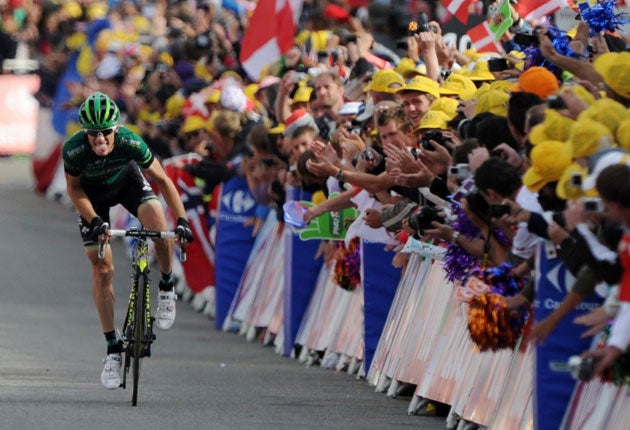Tour de France: Is this the best race ever? Not quite, but it may prove to be the most important
After the crashes of the first week, some exceptional racing has helped the Tour to recover its soul

So can we call this year's Tour de France the best of recent history? It's very tempting to do so.
However, even if the answer is finally no – so far – thanks to a certain Andy Schleck, Cadel Evans and, above all, the spellbinding courage of Thomas Voeckler, the race's last week has certainly been one of the most gripping in the 20 years I've covered the Tour. And it's not just me that's getting excited about it. Eddy Merckx, cycling's all- time great, has pretty much seen it all and is not easily impressed. But the way "The Cannibal" was leaning out of the roof-hatch of the Tour director's car and bellowing encouragement at Schleck as he powered to Thursday's epic win on the Galibier was surely an indication that something extraordinary was going on.
The same goes for the poker-faced Bernard Hinault, five times a Tour winner and overly fond of berating the modern-day peloton for a collective lack of resilience. "I can't do anything but salute Voeckler's fabulous courage," Hinault gushed in yesterday's edition of Le Figaro. "He's going beyond his limits."
Whatever happens between now and Paris, this is a race that is regaining momentum with its key public almost as fast as Mark Cavendish in a bunch sprint.
Record audiences are reported across Europe, and if you might expect that in Norway – with an average audience share of 41.33 per cent for broadcaster TV2 – given the way Thor Hushovd and Eddie Boasson Hagen have been racking up the stage wins, even in the Netherlands, despite a dismal Tour for the Dutch, it's still at 45.66 per cent for NED1.
Is that a surprise? Stating the very obvious, TV is all about images, and for touchingly human ones, the 2011 Tour has been a bumper year. Just to take Thursday, Voeckler weaving his way to the line on the highest ever summit finish on the Galibier, with just enough strength to raise one arm in triumph as he defended his lead, has to take the biscuit.
But Schleck's steely-faced determination as he battled up the Lauteret, Evans' incredulous waving of his head as he realised all the weight of the pursuit was on his shoulders, and then the Australian's open-mouthed gurning during his all-out 40-minute chase behind, will remain long in the memory, too.
Even the prefabricated images have had their charm. Mark Cavendish mimicking the same victory gesture at Châteauroux as when he first won there in 2008 was planned, but still entertaining.
Visual impact apart, the Tour's ability to strike such a deep chord with the public this year is greatly helped by the uncertainty of the final outcome. Neither of the two top candidates for the podium– Andy Schleck and Cadel Evans – has ever won a major tour, let alone the Tour de France. They could yet have a bad day today during the time trial.
The contrast with a patchily eventful first fortnight, dominated in the headlines by crashes, has made this last week even more splendid.
But since last Tuesday, accidents, touch wood, have been more spectacular than dangerous – Thomas Voeckler's three near-misses at Pinerolo on Wednesday must have had TV viewers on the edges of their seats – and the racing has been the big news.
And if Schleck's epic mountain solo on Thursday has reminded fans worldwide why the Tour remains the biggest annual sporting event on the planet, for the host nation this Tour has an incomparable feel to it. Voeckler's 10-day reign in yellow is the best local performance since Laurent Fignon lost the Tour by eight seconds back in 1989.
So why is it not the best? Partly because the 2011 Tour has taken overly long to kick into life and because too many of the favourites – Bradley Wiggins among them – have headed for home early because of crashes. In the case of another Tour contender, Alexandre Vinokourov, his skid into a ravine and broken femur spelled the end of his career. For him, 2011 will be a Tour to forget, and the same goes for Juan Antonio Flecha and Johnny Hoogerland after they were struck by a France Television car in an utterly pointless accident.
What is certain, in any case, is that this Tour feels more alive than it has done for years. After Lance Armstrong's brilliantly unexpected victory in the 1999 Tour, his neverending succession of wins became automated and monotonous, all glitter and forced amazement, and Alberto Contador's unbeaten run of six wins in his last six major Tours and bid to take a seventh threatened to maintain the tedium.
However, thanks to Voeckler and Schleck, the battle for supremacy has regained what it briefly possessed with Armstrong in his earliest Tour victories, when his beating cancer amazed the world, but then lost as the suspicion of drug use and an atmosphere of collective paranoia kicked in: a human edge.
That recovery will not make 2011 the greatest Tour of recent years. But there can be little doubt that whoever the winner, this year will be one of the most important in its history.
Subscribe to Independent Premium to bookmark this article
Want to bookmark your favourite articles and stories to read or reference later? Start your Independent Premium subscription today.

Join our commenting forum
Join thought-provoking conversations, follow other Independent readers and see their replies